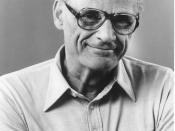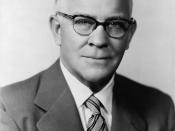Death of a Salesman is probably one of Arthur Miller's greatest achievements. This play describes the sixty-three-year-old protagonist Willy Loman, a rounded and psychologically motivated individual. Willy is also a familiar American Philistine and even a universal type. He embodies the stupidity, immorality, self-delusion, and failure of middle-class values Miller portrays as being sterile and vicious. At the same time Willy's love of his delinquent sons, however harmful and wrongly expressed has made him "a King Lear in mufti." The transparent skeletal settings may be altered instantaneously; they modify naturalism into an expressionistic and dreamlike dramatization of Willy's free association, shifting between and confusing the present, the past, and the hallucinatory. These converge on Willy's tortured consciousness during the last two days of his life.
The disillusionment, ending in suicide of Willy, a tragic figure who has lost the knack of selling himself and the product he represents. An indictment of commercialism and false values that ends with a plea by Willy's wife that attention must be paid to those who fail in achieving the popular concept of success.
It probes the distorted values responsible for the failure of its central figure. Willy Loman is a salesman of small achievement who worships business and small success. His two sons, Biff and Happy, are as unsuccessful as he, but their failure derives mostly from Willy's confused ideals and social blindness. In the end, Biff makes Willy's see their lives are empty dreams, and Willy kills himself in the final illusion that his insurance money will enable Biff to achieve success.
Willy is a salesman who has seen better days, or at least lets himself believe he was once more appreciated by his employers. His life has been devoted to his work, his wife, and his sons, Happy and Biff.



Great Essay
What a lovely concise and informative essay. Death of a Salesman is a fantastic play, and you have done it justice by writing an insightful and sound analysis. Great!
1 out of 3 people found this comment useful.